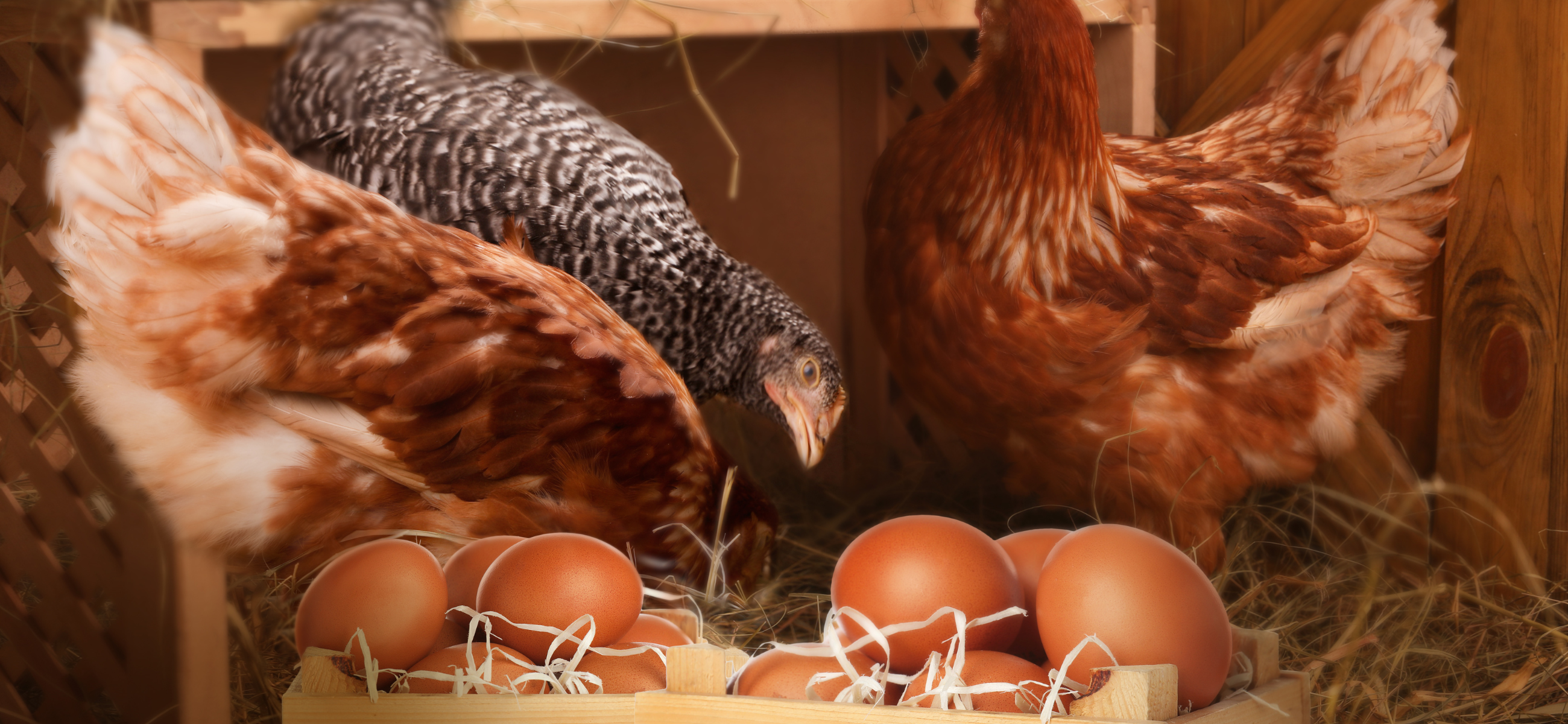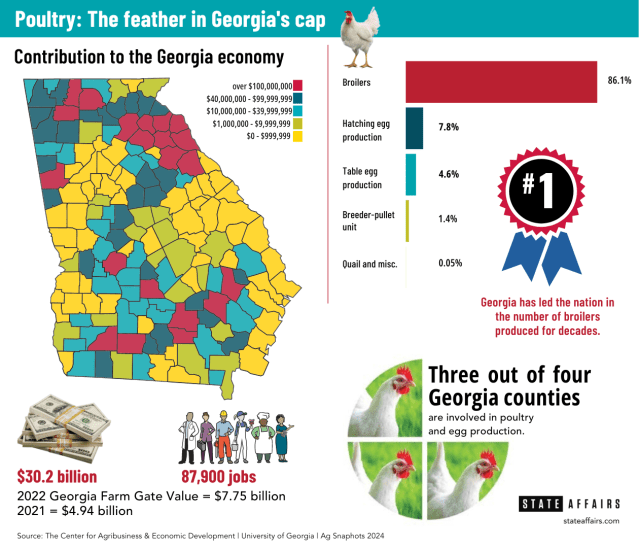Stay ahead of the curve as a political insider with deep policy analysis, daily briefings and policy-shaping tools.
Request a DemoIs it safe to eat chicken and eggs and drink milk? Answers to your most pressing questions about the latest bird flu outbreak

Fresh eggs and chickens in a henhouse. (Credit: Africa images)
A two-year-old strain of bird flu has heightened concerns in Georgia and the rest of the country after the virus recently spread to dairy cows.
Here’s what you need to know about the virus and its impact on Georgia and the rest of the country.
What are the symptoms of this flu in humans?
Eye redness, fever, cough, sore throat, runny or stuffy nose, muscle or body aches and pneumonia. Some people may have no symptoms at all but still have the flu.
Should I be worried?
Any case of H5N1 is a concern because it is highly dangerous to humans although it doesn’t seem to be easily transmissible between people, the director-general of the World Health Organization said earlier this month. The two U.S. cases that have been reported have been mild, but H5N1 infections outside of this country have had high death rates.
Is H5N1 deadly to humans?
Nearly 900 laboratory-confirmed cases of human infection with H5N1 were reported in 23 countries between January 2003 and February 2024, according to the World Health Organization. Of those who were infected, 462 died.
So, bottom line, is it safe to eat chicken and eggs, and drink milk in Georgia?
“Any milk products for sale at your local grocery store, consumers can and should feel confident in the safety of those products as well as chicken and eggs,” Matthew Agvent, a spokesman for the Georgia Department of Agriculture, told State Affairs.
What is the current strain of bird flu that is causing so much concern?
It is Influenza A/H5N1, a highly pathogenic avian influenza or HPAI. It was first detected in 1996 and has since re-emerged and spread over the years. Outbreaks have become more common due to the rapid growth and frequent movement of the world’s poultry population.
How is this bird flu different from previous ones?
This latest outbreak of H5N1 avian influenza has been ongoing since 2022 and is the largest outbreak in recent history — impacting both domestic poultry and livestock as well as wild birds and some mammal species. More information about specific strains of avian influenza is available here.
How bad is the outbreak in the nation’s poultry industry?
Since its start on Feb. 8, 2022, 90.8 million birds in the United States have been destroyed after being infected. HPAI has been found in 1,128 flocks in 48 states. Of those, 483 flocks have been commercial and 645 flocks have been backyard. A commercial flock has 1,000 or more birds. A backyard flock has fewer.
In Georgia, roughly 35,000 birds had to be destroyed over the last two years due to the virus, Agvent told State Affairs. A complete picture of the ongoing outbreak in domestic poultry is available at USDA’s website.
Aside from the three reported counties, are there other cases of bird flu in Georgia?
In November 2023, a case of HPAI was found in Sumter County at a commercial waterfowl operation. Outbreaks occurred in backyard flocks in Henry and Toombs County in 2022.
What about dairy cows?
Georgia has had no reported or confirmed cases of HPAI in dairy cattle to date. State agriculture officials are working with dairy producers, veterinarians, and the National Animal Health Laboratory Network to use the U.S. Department of Agriculture’s new tracking, reporting, and movement requirements outlined in the federal order issued on April 24th. HPAI confirmations have been detected in 33 dairy cattle herds across eight states so far, according to the USDA. At this point, the USDA has not reported any deaths attributable to HPAI in dairy cattle.
Which states have found bird flu in dairy cows?
As of mid-April, the strain of flu known as Type A H5N1 has been found in at least 26 dairy herds in Idaho, Kansas, Michigan, New Mexico, North Carolina, Ohio, Texas and South Dakota. Here’s the Center for Disease Control and Prevention’s latest detection data.
What precautions is Georgia taking to prevent the virus from spreading?
Since the beginning of this outbreak, Georgia poultry producers have implemented enhanced biosecurity measures and have been very successful in protecting commercial poultry flocks in Georgia.

Have questions? Contact Tammy Joyner on X @lvjoyner or at [email protected].
Know the most important news affecting Georgia
Get our free weekly newsletter that covers government, policy and politics that impact your everyday life—in 5 minutes or less.
Professionals still face licensing delays amid state’s transition to online system
The Gist Georgia’s professionals and business owners are still struggling to obtain professional licenses in a timely manner. As the Secretary of State’s Office rolls out its new Georgia Online Application Licensing System to expedite the process, the efficiency of this new process is being put to the test. What’s Happening Thursday morning at the …
Controversy over AP African American Studies class grows
Rashad Brown has been teaching Advanced Placement African American Studies at Atlanta’s Maynard Jackson High School for three years. He’ll continue to do so — even though the state’s top education official removed it from the list of state-funded course offerings for the upcoming school year. While Brown prepares to start teaching his class on …
Students, teachers, lawmakers blast decision to end AP African American history classes
ATLANTA — A coalition of lawmakers, civil rights leaders, clergy, educators and students Wednesday called on the state’s education czar to rescind his decision to drop an advanced placement African American studies class from the state’s curriculum for the upcoming school year. “This decision is the latest attack in a long-running GOP assault on Georgia’s …
Kamala Harris’ presidential bid reinvigorates Georgia Democrats
Georgia Democrats have gained new momentum heading into the November election, propelled by President Joe Biden’s decision to bow out of his reelection bid and hand the reins to Vice President Kamala Harris. The historic decision, announced Sunday, is expected to prove pivotal in the national and state political arenas and breathe new life and …




